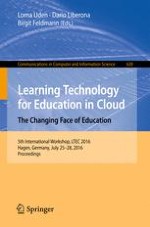2016 | Book
Learning Technology for Education in Cloud – The Changing Face of Education
5th International Workshop, LTEC 2016, Hagen, Germany, July 25-28, 2016, Proceedings
Editors: Lorna Uden, Dario Liberona, Birgit Feldmann
Publisher: Springer International Publishing
Book Series : Communications in Computer and Information Science

 - Reflect) to build and program robots to solve systematic problems. This paper will demonstrate that learners actively engaged in iteratively challenging robot-mediated interactive tasks can develop generic, declarative and epistemic competencies, with a consequential development of meta-learning.
- Reflect) to build and program robots to solve systematic problems. This paper will demonstrate that learners actively engaged in iteratively challenging robot-mediated interactive tasks can develop generic, declarative and epistemic competencies, with a consequential development of meta-learning.